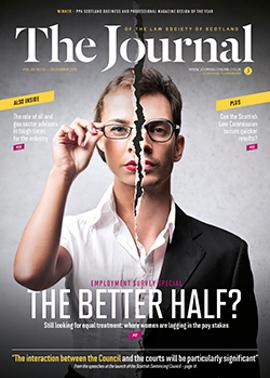Opinion: Davinia Cowden

The legal profession has changed dramatically and, in some ways, beyond recognition over the past 10 years. Virtually gone are the days of being able to bill hourly rates, of travelling drafts, of comparison teams, of word processors, of promotion to partner on the basis of time served. Whilst some of us may look back and wish that not all of that had changed (and perhaps make a weary sigh like me at the prospect of learning how to tweet, how to put execution in counterparts into practice or how not to lose the rag at your computer constantly dropping its wifi connection), many positive steps have been taken since then.
For me, 2015 has represented a year of real change and awareness. For the first time in my career, I’m seeing true honesty and openness about gender equality (and diversity as a whole) in the profession and in the wider workplace. Where, once upon not-such-a-long time ago, fellow professionals would not openly share experiences (good or bad) regarding their employment, I’m now finding myself regularly involved in discussions about challenges faced and initiatives being undertaken to improve gender equality and improve diversity.
The Law Society of Scotland has had a significant part to play in promoting discussions relating to gender equality in the Scottish legal profession. The Society recently published a report about the gender pay gap showing quite startling statistics: in the UK as a whole, the pay gap is 14.2% for full- time employees, which is the same as the average female employee not being paid for working beyond 9 November, whereas in the Scottish legal profession, the pay gap is up to 42% for full-time employees, which is the same as the average female lawyer not being paid for working beyond 31 July. These figures chime with the message which I’m hearing quite loudly and clearly these days – yes, women have come a long way since the early 20th century to achieve greater parity with men, but we have not achieved full equality yet and there is still a lot to be done to get there.
I believe that equality and diversity should be at the cornerstone of the modern legal profession. As lawyers, we seek equality in all that we do – for our clients and for ourselves to be treated as an equal irrespective of what or who we are, of where we come from, of our beliefs and our aspirations in life. If we expect, as professionals, to enforce laws which protect equality and diversity, surely we cannot be considered credible if we do not respect equality and diversity amongst ourselves?
I’ve never known the legal profession to specifically encourage networking amongst its peers and competitors, without there being some other element of potential client development. Perhaps this is a by-product of the way in which we win work or obtain clients by being seen to be better than the next lawyer or law firm. And I wonder whether that is the reason why, until very recently, there haven’t been organisations or groups which seek to bring competing legal professionals together to raise awareness of, and support each other through, a common problem. However, when a problem is of this scale and nature, I believe we have to come together – be it to exchange best practice to find ways to improve practices across Scotland, or to show junior professionals that there are successful individuals in the profession who do not necessarily “have it all” but have achieved an incredible amount despite gender, race, religion, background or sexual orientation.
And so Women in Law Scotland was born. Three women at different stages of their careers have come together to create a platform for discussion and, hopefully, change. A networking group created to fill a gap and help create a path forward for the legal profession. At WiLS, we don’t have the answers but we do wish to represent those in the network. We wish our members to tell us whether they want a forum to simply network with peers, a platform to discuss issues and influence change, a means to find a “buddy” or a mentor in the legal profession who can help guide or support another in the profession.
We believe it is essential that to achieve a common goal of equality, we have to work together.
In this issue
- Dealing with mistakes as a trainee solicitor
- Landlords: police or prisoners?
- The evolving duty of trust and confidence
- The nobile officium: still relevant, still useful
- Reading for pleasure
- Opinion: Davinia Cowden
- Book reviews
- Profile
- President's column
- One year on
- People on the move
- Equal with whom?
- Sentences by the book
- Weathering the storm
- Law reform: securing a result
- There ought to be a law
- Reform in the air
- Taking a stand against slavery
- Where the bill falls short
- IP disputes and the corporate veil
- Bar reports no more
- Dutee Chand – a marathon for a sprinter
- Scottish Solicitors Discipline Tribunal
- Advance notices and letters of obligation
- Another school round for YFIL
- Aileen takes up key membership role
- Criminal practice note alert
- Law reform roundup
- My time for nothing
- Mentoring: the neighbour principle
- Magic bullets
- Recognising paralegals
- Commission on a mission
- Ask Ash
- You had your say






